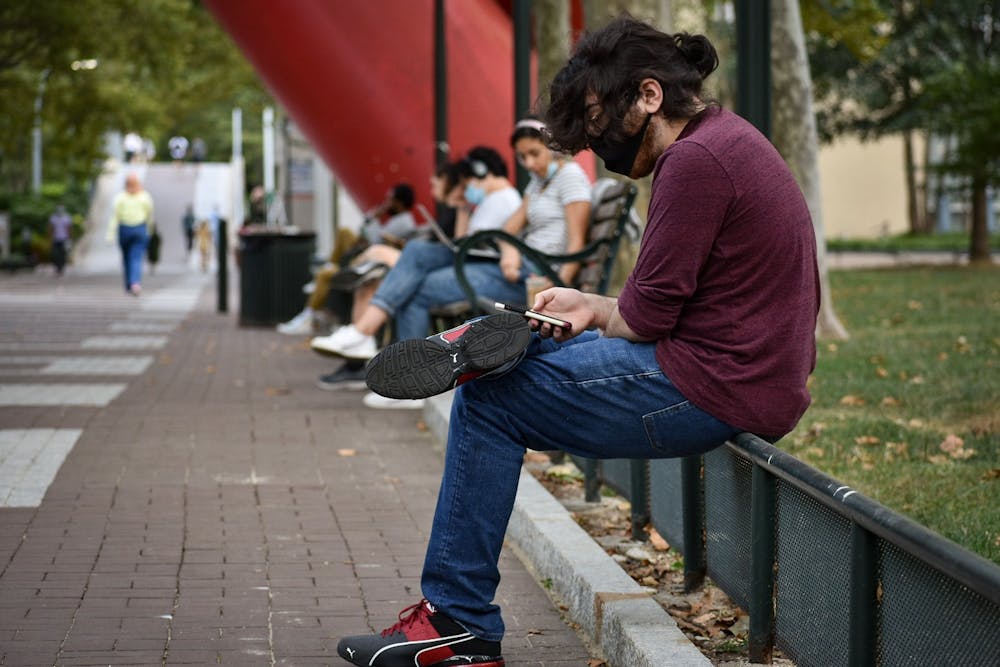To offer interdisciplinary perspectives on the COVID-19 pandemic, the School of Arts and Sciences has launched a new weekly podcast.
The “In These Times” podcast, whose six-episode first season focuses on the current and future impacts of the coronavirus pandemic, was created by OMNIA, a SAS magazine. The podcast launched on Oct. 28, and new episodes are released every Wednesday on Apple Podcasts, Spotify, Stitcher, and other major podcast sites, said Alex Schein, SAS director of digital communications and the podcast’s host.
All six episodes will focus on analyzing the pandemic from a different academic perspective and will feature interviews with SAS faculty and students. The first episode, featuring biology, philosophy, and sociology professors, examines health inequalities including how COVID-19 disproportionately impacts people of color. The second episode explores how the United States and the world have responded to past epidemics through conversations with Penn historians and an English professor.
OMNIA launched in 2015 and, according to its website, aims to connect its audience to the “important research and tremendous creativity of the School’s faculty, students, and alumni.” OMNIA publishes a print magazine twice a year.
The podcast fills a similar role to the online publication, SAS Executive Director of Communications Loraine Terrell said, because it allows listeners to see the COVID-19 pandemic through the lens of the arts and sciences.
There had been talks to expand the multimedia branch of OMNIA to include more podcasts before the pandemic, but once the team was forced to work remotely starting in March, podcasting presented itself as the perfect opportunity to create a high-quality product from home, Lauren Thacker, SAS director of advancement communications said. Thacker produced episode one of the podcast and will produce episode five.
“COVID is more than just a respiratory illness. It has affected every aspect of our lives, and it's affecting people differently,” Thacker said. “The Penn Arts and Sciences faculty can offer unique perspectives that aren't necessarily coming up in the popular discourse that we're so used to hearing.”
OMNIA did not release an episode this week because of the Nov. 3 presidential election, but episode three will be released next Wednesday, Schein said.
RELATED:
Penn administrator Ezekiel Emanuel named to Joe Biden's COVID-19 transition task force
Penn reports 107 new COVID-19 cases from last week — the highest weekly case count yet
Terrell said that curating the content to fit into the six episodes for “In These Times” was not an easy task. She was struck by the number of meaningful connections that SAS’s different academic departments were able to make to the pandemic.
For Schein, his biggest takeaway from the podcast project has been seeing how the COVID-19 pandemic has only exacerbated inequity throughout the world. He said two of the upcoming episodes dig deep into these disparities, and he hopes the pandemic can show people that change is necessary.
“Many people may have been aware of the existing inequalities, but if you put a pandemic on top of that, it adds a new perspective,” Schein said. “Hopefully this creates more motivation and momentum to look at the climate crisis, racial inequality, or poverty.”
OMNIA had planned for an eventual season two of "In These Times" since the series' inception, and as the team was producing the first season, it became clear to them that the second season would focus on racial justice.
This past summer, OMNIA hosted a series of 60-second lectures, What Happens to a Dream Deferred?, to address systemic racism from a variety of different disciplines, Thacker said. She said that season two of “In These Times” will allow the group to tell a “fuller and more detailed story.”
The team began conducting their interviews for season one in April, Schein said, and the content is increasingly relevant as the pandemic worsens. By giving experts in their fields 10-12 minutes to share their thoughts, he hopes “In These Times” can act as a snapshot of academic research in the coming years.
Terrell said in the middle of a big, historical event like the current pandemic, it is hard to make sense of the moment, but she hopes “In These Times” can serve the purpose of being a time capsule for the future and a guide for the present.
“The podcast is helping us in the current moment gain the kind of perspective on the larger cultural significance of what we're going through,” Terrell said. “By connecting it to the past we can think about what this might mean for our culture when, one day, we get past this.”









